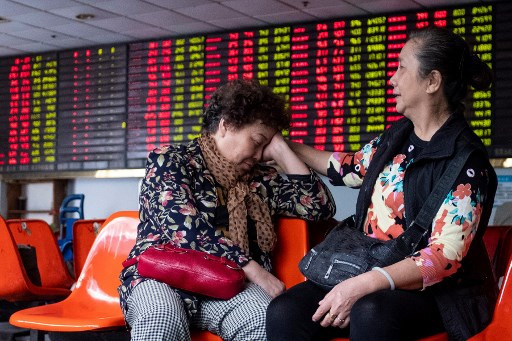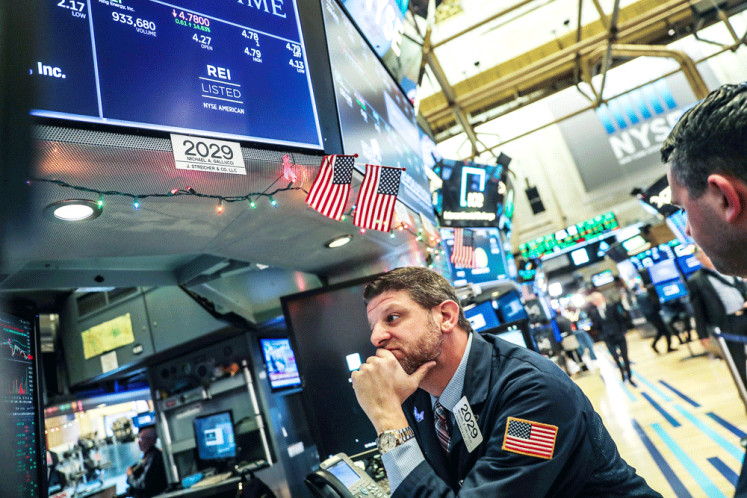Popular Reads
Top Results
Can't find what you're looking for?
View all search resultsPopular Reads
Top Results
Can't find what you're looking for?
View all search resultsGlobal shares head for worst week since 2008 financial crisis
The worsening global threat from the virus prompted investors to rapidly step up bets the US Federal Reserve would need to cut interest rates as soon as next month to support economic growth.
Change text size
Gift Premium Articles
to Anyone
G
lobal share markets headed for the worst week since the darkest days of the financial crisis in 2008 as investors braced for the coronavirus to morph into a pandemic and derail world economic growth.
Hopes that the epidemic that started in China would be over in a few months and economic activity would return to normal have been shattered, as new infections reported around the world now surpass those in China.
The worsening global threat from the virus prompted investors to rapidly step up bets the US Federal Reserve would need to cut interest rates as soon as next month to support economic growth.
“We don’t even need to wait for economic data to see how badly the economy is being hit. You can tell that the sales of airlines and hotels are already falling by a half or something like that,” said Tomoaki Shishido, senior economist at Nomura Securities.
“It is fair to say the impact of the coronavirus will be clearly much bigger than the US-China trade war. So the Fed does not have a reason to take a wait-and-see stance next month,” he said.
MSCI all country world index fell 3.3 percent on Thursday to bring its losses so far this week to 8.9 percent, on course for its biggest weekly decline since a 9.8 percent plunge in November 2008.
Read also: Stocks near 3-year low as foreign investors post huge sell-off amid virus fears
Wall Street shares led the rout as the S&P 500 fell 4.42 percent, its largest percentage drop since August 2011.
It has lost 12 percent since hitting a record close on Feb. 19, marking its fastest correction ever in just six trading days while the Dow Jones Industrial Average fell 1,190.95 points, its biggest points drop ever.
In Asia, MSCI's regional index excluding Japan lost 0.6 percent. Japan's Nikkei gave up 2.5 percent on rising fears the Olympics planned in July-August may be called off due to the coronavirus.
Australian shares dropped 3 percent to a six-month low while South Korean shares shed 1.4 percent.
“The coronavirus now looks like a pandemic. Markets can cope even if there is big risk as long as we can see the end of the tunnel,” said Norihiro Fujito, chief investment strategist at Mitsubishi UFJ Morgan Stanley Securities. “But at the moment, no one can tell how long this will last and how severe it will get.”
The World Health Organization (WHO) said all countries need to prepare to combat the virus as the outbreak spread to major developed economies such as Germany and France.
Play the market: Traders work on the floor of the New York Stock Exchange (NYSE) in New York in this undated file picture. (Reuters/Jeenah Moon)Fears of a major economic slump sent oil prices to their lowest level in more than a year. US crude futures fell to $46.28 per barrel.
As investors flocked to the safety of high-grade bonds, US bond yields have plunged, with the benchmark 10-year notes yield hitting a record low of 1.241 percent. It last stood at 1.274 percent.
That is well below the three-month bill yield of 1.439 percent, deepening the so-called inversion of the yield curve. Historically an inverted yield curve is one of the most reliable leading indicators of a US recession.
Expectations the Fed will cut interest rates to cushion the blow are rising in money markets, with Fed funds futures now pricing in a good chance of a move as early as next month.
As investors rushed to safe assets, gold stood at $1,646.4 near seven-year high of $1,688.9 hit earlier this month.
In currency markets, the yen rose to a three-week high of 109.33 to the dollar and last stood at 109.47.
The euro stood at $1.1005, having jumped over 1 percent in the previous session, the biggest gain in more than two years as investors wound back bets against the currency versus the dollar.











